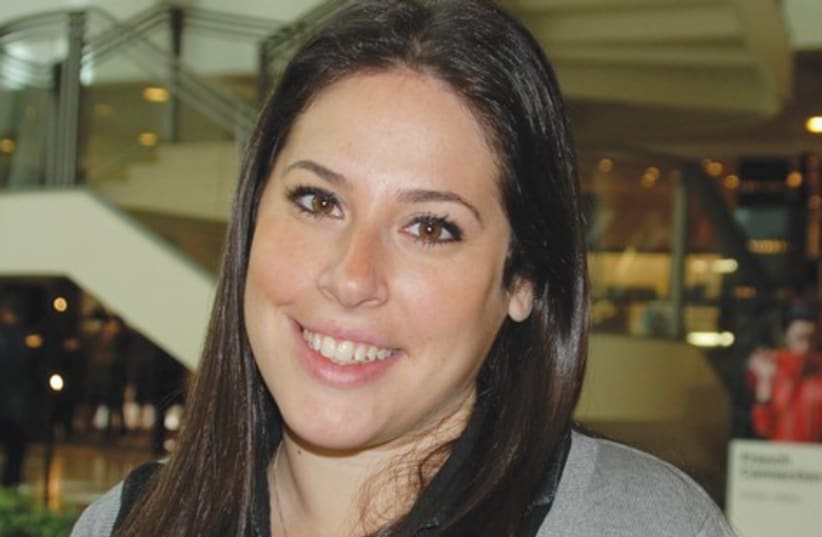Born in Poughkeepsie in 1982, she earned a degree in American history at the University of Albany and fulfilled a youthful dream by moving to Manhattan in 2004. Jobs were hard to come by, and she ended up becoming a production assistant to a film company – which gave her plenty of experience, but no actual pay.Israel seemed a more attractive alternative; she had been here as a teenager, had a large family of cousins here and, most of all, felt impelled by the sadness of her fellow campers to want to do something more concrete for Israel.“I scoured the Internet looking for a suitable program. There were many possibilities, but I wanted something that gave a degree of independence. I wanted to be able to travel around and not be stuck in a kibbutz,” she says.She finally chose a five-month program with the Jewish Agency’s Masa organization and ended up teaching English to new immigrant students in Ramle. She also helped out in the community, including, on one memorable occasion, painting park benches. After three months in the program, she decided she wanted to make some Israeli friends.“I knew if I stayed in the American bubble, I wouldn’t learn Hebrew and wouldn’t integrate,” she says.She devised a plan: “I went and sat in a bar every night with a friend. And it worked! They might have thought I was a crazy American at first, but I do have an outgoing personality and I made many friends that way.”After eight months, she decided to make aliya officially and contacted the Jewish Agency.“I kept calling them and leaving messages, and they never answered,” she says, but adds that “in fairness, I have to explain that there was another immigrant with exactly the same name, and eventually it was all sorted out.”WORK AND ACTIVITIES
She got a job with an American company selling promotional products, and stayed there for three years before deciding that she needed a graduate degree.She began studying for a master’s in management.“After I’d been here three years working in this job and getting into a routine, I woke up one day and told myself I’d lost the passion of why I came to Israel in the first place,” she recalls. “I decided I must get back to being an active Zionist – that living here just wasn’t enough.”She began volunteering at World Magshimei Herut, an organization founded in 1999 for young adults dedicated to the ideals of aliya, social justice and the territorial integrity of the Land of Israel.“I’m not involved in the political side,” she emphasizes. But she is active in both this organization and in Masa, and loves talking to potential immigrants and explaining why she loves Israel and why they should be here.She completed her master’s degree and taught herself to work in online marketing.She now has a job as a community manager for a gaming company, which she enjoys – though she says it’s not yet her dream job.That dream job, she says, would be to use her marketing skills to promote the programs she was on, as she found them helpful, and to play her part in encouraging more aliya.LIFE IN ISRAEL
Meanwhile, she rents an apartment in Tel Aviv and lives there with her Israeli boyfriend, whom she is hoping to marry eventually. She confesses to being obsessed with news and follows every development anxiously. The language is proving to be something of a problem.“I finally finished ulpan quite recently, but I’m a little embarrassed to speak Hebrew and only do it when I absolutely have to,” she says.“I want to raise my kids here,” she says. “I love living in Israel. I love it that when I go to a kiosk to buy a drink, they wish me ‘Hag Sameah [happy holiday].’” Groner feels that to be Jewish in America, you have to be observant, and for a time she was; but once she moved to Israel, she didn’t feel the need to be religious.“Here, I feel Jewish enough,” she says.
